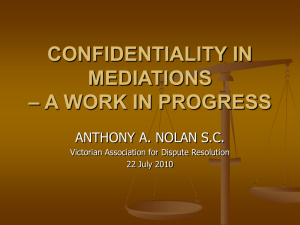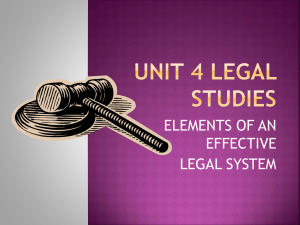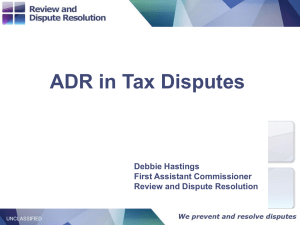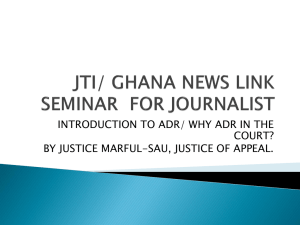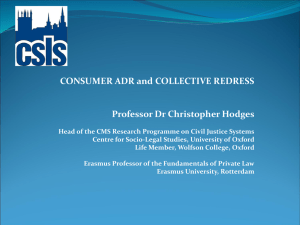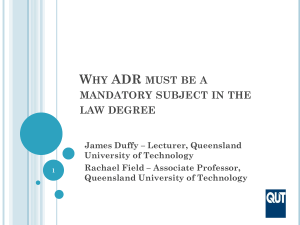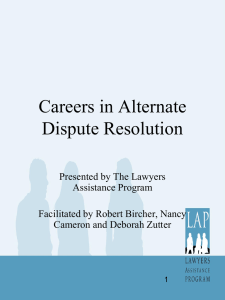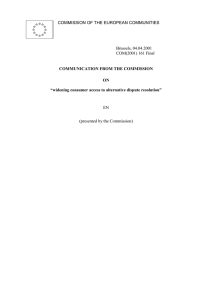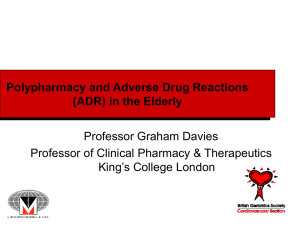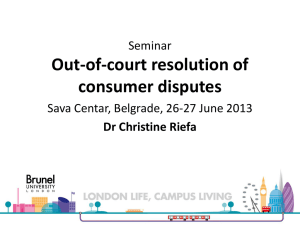when lawyers and engineers collide the resolution
advertisement
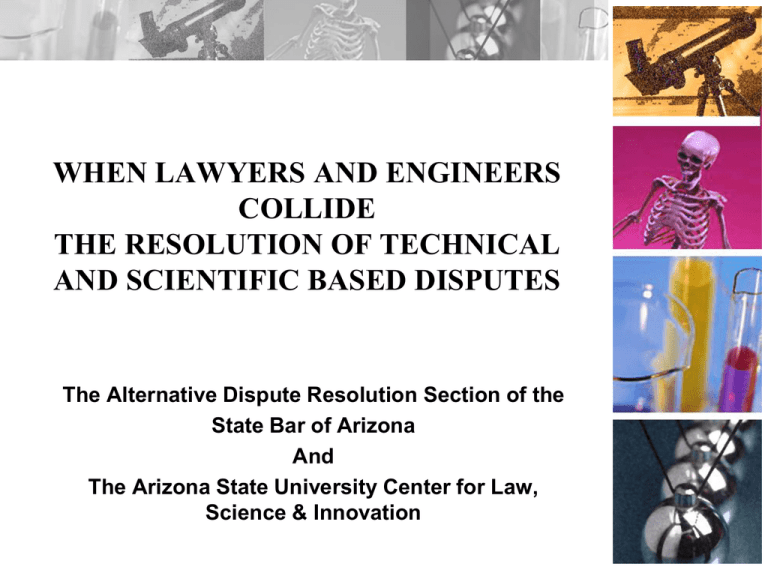
WHEN LAWYERS AND ENGINEERS COLLIDE THE RESOLUTION OF TECHNICAL AND SCIENTIFIC BASED DISPUTES The Alternative Dispute Resolution Section of the State Bar of Arizona And The Arizona State University Center for Law, Science & Innovation Agenda • Greetings and Overview – • Resolution Issues and Impediments in Specific Areas – • • Environmental -- Bob Copple • Intellectual Property – Michael Lang • Construction / Transportation – Ruth Franklin • Public Utilities – Kris Mayes • Governmental Parties and Regulators – John Godec Panel Discussion – Commonalities and Distinctions ADR Processes, Techniques and Solutions – • Gary Marchant and Bob Copple Panel Discussion • Pre Litigation Phase • Litigation Phase Reception Immediately Following the Program Slide 2 Resolution Issues and Impediments in Environmental Disputes Scenario • Large Hazardous Waste Spill (CERCLA or OPA) • Multiple Potentially Responsible Parties • Multiple Federal and State Regulators • Legions of Experts For – Each Party – Each Regulator – Each Effected Medium (i.e., Air, Water, Soil) • Direct Impact on Public and Public Resources • Numerous Related and Conflicting Actions and Claims Slide 3 … The Whack-A-Mole World of Environmental Disputes Citizen Suits Political Pressure Private Personal & Economic Injury Claims Conflicting Cleanup Standards PRPs & Regulators Legions of Competing Experts Related Federal State Actions Inter PRP Claims Insurance Coverage Litigation Technical and Scientific Complexity • Trustee Experts, Agency Experts, RP Shadow Experts, RP Testifying Experts, etc. • Studying Complex Environmental Systems • Using Wide Variety of Methods from Direct to Ethereal • All Looking at Broad Questions of Injury, Restoration and Compensation • Results in a Wide Range of Conclusions and Opinions Slide 5 Types of Intellectual Property (“IP”) • • • • • Trade secrets Copyright Trademarks/Domain names Patents Licenses © Michael J. Lang 2011 Slide 6 mlang@ngtechlaw.com ADR Advantages/Disadvantages for IP Disputes • Advantages in general – – – – – – Cost Speed Finality of decision Control of trade secrets and company records Knowledge/control of Arbitrator(s) Discovery unknown to other potential infringers – Basis of decision unknown to other potential infringers – Can settle by agreement and/or license – Bridging multi-national disputes (WIPO) © Michael J. Lang 2011 Slide 7 mlang@ngtechlaw.com ADR Advantages/Disadvantages for IP Disputes • Disadvantages in general – – – – – – – – – – Both sides must agree to ADR No appeal; has no precedent No special damages No injunctions No attorneys’ fees Surrender Federal Jurisdiction No holding of IP to be valid and enforceable Knowledge/control of Arbitrator(s) Enforcing ADR decision or settlement agreement Litigating the issue may be the outcome © Michael J. Lang 2011 Slide 8 mlang@ngtechlaw.com U.S. Patents • • • • • • • • • • Most IP attorneys advise against ADR for patent infringement Establishment of “Rocket Dockets” Trade secrets safe & limited PR Limited discovery No Markman hearing; Arbitrator(s) interpret(s) patent claims No juries No appeal to Fed Cir. (about 50% reversal rate) Δ losses claims for: rule 11; abuse judicial sys; malicious prosecution; inequitable conduct Π losses claims for: willful infringement; injunctive relief; special damages; and a holding of valid and enforceable Settlement agreements on courthouse steps © Michael J. Lang 2011 Slide 9 mlang@ngtechlaw.com Construction • Complexity: – Number of decision makers – Diversity in professions – Number of solutions • Science may not be well understood by advocates and some decision makers • Differing standards for establishing responsibility – Customary rather than empirical Slide 10 Transportation • Political and Governmental Influences – Budgetary Constraints • Scientific Consensus • Large numbers of potential stakeholders – Difficult to identify – Shifting desire to engage over multiple years Slide 11 To Settle or Not to Settle: Impediments to Multi-Party Resolution of Utility Ratecases and Other Matters Involving Public Utilities Kris Mayes Director, Program on Law and Sustainability at the ASU Sandra Day O’Connor College of Law Slide 12 Utilities and Settlement • It starts with the constitution: Arizona is one of the only states in the nation in which the public utility commission (ACC) is a branch of the government (Article 15). – Constitution and case law establish a strong preference for stringent review of utility filings and applications for rate increases. – Additionally, Arizona is one of the few states where Commissioners are elected, meaning that the Commissioners feel a special obligation to their constituents to vet cases, and to do so in a way that demonstrates thoroughness. – For Commissions, their Staff, and even the utilities, this has almost universally been accomplished through a fully litigated rate case, pre-hearing data requests (sometimes in the thousands), pre-filed testimony and the use of expert witnesses. Slide 13 • • • Utilities and Settlement Settlement agreements are often eschewed by Commissioners can be a general feeling of abdication of duties. SA’s also not encouraged in the past by Staff for similar reasons. – Staff members of PUCs are motivated by working in the public interest; most view their jobs as watchdogs for the public, working to ensure that every angle has been thoroughly analyzed before sending a case to the Commissioners for their approval. From the utilities’ standpoint, Settlements can cut both ways. – They can take less time, leading to ratecase expense savings (fewer attorneys fees, expert witnesses required), and limiting the regulatory lag that can cut into revenues and earnings. – But Settlements can involve giving up a lot, in particular if multiple parties are in the room demanding specific concessions (environmental clean-up, renewable energy advancement, etc.) Slide 14 Utilities and Settlement • Advantages of Settlements in the Age of New Energy: – Offers an opportunity for a growing set of stakeholders (solar developers, installers, energy efficiency companies, environmentalists, merchant gas generators, etc) to be involved in the process in a way that almost ensures their issues will be addressed by utilities and the Commission. Slide 15 Utilities and Settlement • How to make it happen? – Commissions and utilities that have little to no experience with Settlements need to get one or two under their belts. – Utilities could be encouraged by the Commission, to propose a Settlement in the first instance, especially in complex cases that will draw in multiple Parties/Intervenors. – Some cases will never be appropriate for Settlement. Slide 16 Government Inertia and ADR / Settlement Paralysis Virtually All Agencies Operate Under a Direct or Indirect Mandate to Use ADR, But the Process Often Discourages Actual Application: • Perceived Need to Adhere to Policy and Check All of the Regulatory Boxes • Precedent -- Develop, Bolster, Protect • Inter Agency Bureaucracy & Conflicts • Political Pressure -- Lawmakers, Constituents & Interest Groups • All of Which May Conflict with Public Interest in Expedited Cleanup and Resource Restoration Slide 17 Government ADR Proclamations and Limitations APA 5 USC 572 • General authority • (a) An agency may use a dispute resolution proceeding for the resolution of an issue in controversy that relates to an administrative program, if the parties agree to such proceeding. • (b) An agency shall consider not using a dispute resolution proceeding if-• (1) a definitive or authoritative resolution of the matter is required for precedential value, and such a proceeding is not likely to be accepted generally as an authoritative precedent; • (2) the matter involves or may bear upon significant questions of Government policy that require additional procedures before a final resolution may be made, and such a proceeding would not likely serve to develop a recommended policy for the agency; • (3) maintaining established policies is of special importance, so that variations among individual decisions are not increased and such a proceeding would not likely reach consistent results among individual decisions; • (4) the matter significantly affects persons or organizations who are not parties to the proceeding; • (5) a full public record of the proceeding is important, and a dispute resolution proceeding cannot provide such a record; and • (6) the agency must maintain continuing jurisdiction over the matter with authority to alter the disposition of the matter in the light of changed circumstances, and a dispute resolution proceeding would interfere with the agency's fulfilling that requirement. • (c) Alternative means of dispute resolution authorized under this subchapter are voluntary procedures which supplement rather than limit other available agency dispute resolution techniques. Slide 18 Public Participation Public sentiment is everything. With public sentiment, nothing can fail; without it nothing can succeed. - Abraham Lincoln Slide 19 Public Participation I do not represent public opinion: I represent the public. There is a wide difference … between the real interests of the public and the public’s opinion of those interests. I must represent … real interests of the whole people. - Theodore Roosevelt Slide 20 Public Participation Slide 21 The End of Nuclear Power? • Fukushima Daiichi Nuclear Complex • 104 Operating Plants in the U.S. – many near population centers and fault lines • USNRC Poised to Approve 20 New Reactors Slide 22 Even if the risk of catastrophe is tiny, “the worst-case scenario is so dreadful as to be unthinkable.” - The Week - The Washington Post Slide 23 Energy Source Risks • Oil Rigs Blow Up and Spill • Coal Mines Collapse and Kill Miners • Wind Mills & Solar Panels Consume Massive Land Mass • NIMBY Slide 24 Energy Source Risks Fossil Fuel Emissions Kill 2-million people annually - far more than “all nuclear incidents worldwide,” including Chernobyl. - Chicago Tribune Slide 25 Public Participation Impediments/Chronic Conflict • • • • Loss of trust and credibility People stop listening to each other Blame the adversary Fixed and simple convictions are displayed • Questions become rhetorical Slide 26 ADR Processes: Transportation • ADR Early and Often – Public engagement with science before planning through completion • Mediators and Facilitators involved from the start – Facilitated partnering during installation – Dispute Resolution Boards before completion Slide 27 ADR Solutions: Transportation • Facilitate scientists working collaboratively – Elemental building blocks of the solution • Mediate the emotional components • Creative use of peer reviews Slide 28 ADR Solutions: Construction • Building knowledge in the ADR professional • Reframing the issues to best address what the parties really want • 80/20 Certainty and Informed Decision Making: – Identify known variables, ranges – Envelop of reasonableness Slide 29 ADR Processes: Construction • Blended ADR Programs: – Facilitate to keep communications open – Neutral Fact finders – Mediate – Arbitrate • Combinations Slide 30 Public Participation Some Solutions • Risk communication -- a two-way exchange of information about threats and consequences – Enhances knowledge and understanding, builds trust and credibility, encourages dialogue, and influences attitudes, decisions, and behavior • Move people from positions to interests Slide 31 IP example: Domain Names • Hypo: A party is using your Registered Trademark of DRINK ONE as domain names www.drinkone.com and www.drink1.com, what can you do? • Anticybersquatting Consumer Protection Act (ACPA) 15 USC §1125(d) • Uniform Domain-Name Dispute Resolution Policy (UDRP) ICANN agreement w Registrar © Michael J. Lang 2011 Slide 32 mlang@ngtechlaw.com IP example: Domain Names • ACPA – – – – Federal Jurisdiction Actual damages or statutory damages Can collect attorneys’ fees Injunction to transfer domain name outside US – Transfer of domain name to trademark owner – Expensive and long timeline © Michael J. Lang 2011 Slide 33 mlang@ngtechlaw.com IP example: Domain Names • UDRP – – – – – – – – Fast (about 2 months) Cheap ($1500 for 1 name; 1 panelist) Domain name locked by registrar upon notice No discovery or hearings; supplement @ panel discretion No damages or attorneys’ fees Only remedy: cancellation or transfer of domain name Decisions: available to public; have no precedent Can be appealed; Jurisdiction: where registrar is located © Michael J. Lang 2011 Slide 34 mlang@ngtechlaw.com
